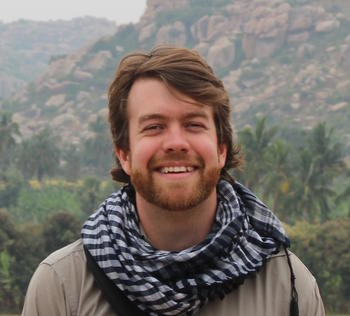Christopher Bahl

SOAS
University of London
The Circulation of al-Damāmīnī’s Grammar Commentaries Across the Western Indian Ocean
Oceans divide continents, but they also connect their shores. From the Red Sea region to Western India, communities were in contact throughout the centuries. Yet, while a substantial historiography examined trade and pilgrimage as crucial transoceanic links, forms of cultural exchange remain on the margins of scholarship. Apart from Persianate flows, Arabic Islamicate texts circulated more prominently during the early modern period across the Sea. The western Indian Ocean became ever more integrated along this Arabic connection. Narrative sources show that more and more people travelled for learned pursuits. More significantly, manuscript collections across this transregional space provide a micro-historical view on connected histories that brought these regions together in a circulation of Arabic Islamicate texts. But how did these texts travel among communities and readers?
The presentation will study social and cultural forms of textual mobility by focusing on one particular case study. At the beginning of the fifteenth century the Egyptian scholar Muḥammad Abū Bakr al-Damāmīnī (d. 828/1424) travelled from Egypt via the Hijaz to Yemen and across Gujarat to the Deccan to seek patronage from various Sultans in exchange for the composition of commentaries on Arabic grammar works. By the end of the fifteenth and throughout the sixteenth centuries his works were listed in the library catalogues of Ottoman Sultans and in biographical dictionaries of the Red Sea region. Transcriptions of his grammar books continued to circulate across Western India, the Red Sea region and the Eastern Mediterranean well into the seventeenth century. It will be argued that al-Damāmīnī’s textual practices in the composition of grammar commentaries were enabled by courtly patronage, but that his intended audiences were primarily scholarly communities. While this tendency can be traced in his compositions, notes on later manuscript transcriptions will show how readers re-appropriated his texts through different paratextual strategies. This enhanced the texts’ social and cultural mobility and enabled their growing circulation and enactment among learned communities beyond the courtly realm in the subcontinent and across the wider Western Indian Ocean.
Christopher Bahl is a PhD candidate in the History Department of SOAS, University of London. He has MAs from the University of Heidelberg and SOAS and studied at the University of Damascus and the Central University of Hyderabad, India. His current project studies the circulation of Arabic Islamicate texts across the Western Indian Ocean based on manuscripts examined in collections across India, Cairo and Istanbul.